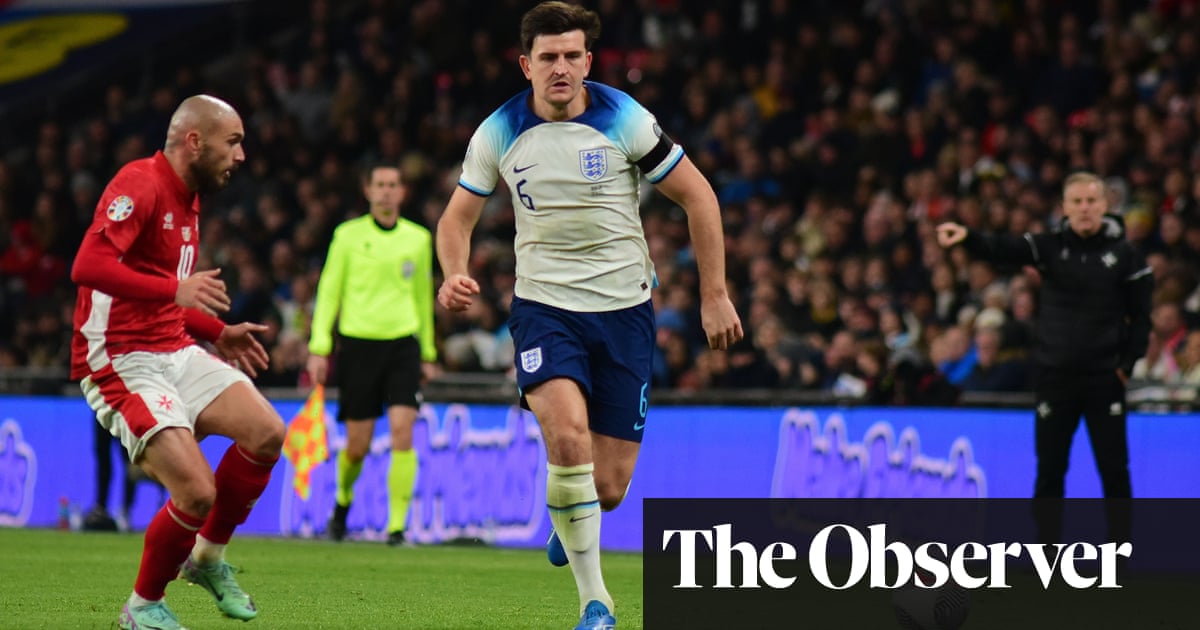
t the time – even amid the ruins of defeat – it felt like the start of something. Even as John Stones cried his heart out, as a distraught Dele Alli chewed on his shirt, as Jesse Lingard stared blankly into the abyss, it was possible to see this moment as Year Zero, the rebirth, the beginning of the next chapter. Yes, Croatia had your number this time. But you’re young. You’ll be back. You too, Eric. You too, Raheem. Maybe not so much you, Phil.
This was, perhaps, why the 2018 World Cup felt so transformative. It wasn’t just the hot summer euphoria, the flying pints, Three Lions back at No 1 in the charts. It was the sense that this was a vivid, exciting group of players who would only get better with time. Seven of the starting XI for the semi-final in Moscow were aged 25 or younger. By the next Euros in 2020, we assumed, this would be a squad approaching full bloom.
Instead, something strange happened. In the space of a single cycle, most of the class of 2018 have stagnated, atrophied, even disappeared. Ashley Young got old. Lingard and Alli went into reverse. Stones seemed to hollow out from within, a player who tripped and stumbled and seemed to lose a little of himself every time. This much, perhaps, could be attributed to the natural entropy and decay of football.
But consider also the travails of Jordan Pickford, Harry Maguire and Kyle Walker, who was cast into the wilderness for a year. Consider, too, why so few of the 2018 squad have kicked on in the meantime. How many of the 23 are unequivocally better players now than they were in Russia? Trent Alexander-Arnold, definitely. Jordan Henderson, Nick Pope, Raheem Sterling, Marcus Rashford, Jamie Vardy: arguably, and even then not by much. That’s it.
Conversely, the wider tale of the 2018 generation is one of curious decline, of careers curdled and progress thwarted. Danny Welbeck is without a club. Ruben Loftus-Cheek has just signed for Fulham on loan. Jack Butland has lost his place at Stoke to Adam Davies. Perhaps this says a little about the fragility of talent, the turbulence of the Premier League, the exacting and exhausting standards required simply to stay afloat. None of this, in itself, is a bad thing.
The thing is, Gareth Southgate talks about Russia a lot. He gets asked about it a little bit, but he brings it up a fair amount himself. “Having a calm ship going into Russia, I think it gave us a better platform on which to perform,” he said at the start of this camp when asked about disciplinary issues. “We recognised that ahead of Russia,” he said on Friday when asked about the need for tactical evolution.
The more you listen to Southgate, the more you realise what a transformative force 2018 was not just in his career, but in his life: a reference point, a template, a muscle memory to call on when things get tough. Again, this is all fine. But as time casts that World Cup further and further into history, as the lessons from Russia – a tournament England didn’t even win – become less and less applicable to the present day, the danger is that memory becomes a crutch. That the longer you go on about “what we did in Russia”, the more you look like a gap-year student still proudly sporting his Fijian whale-tooth necklace at the age of 28.
Pickford is perhaps the biggest beneficiary of this. There is no way an uncapped keeper in his current form would be anywhere near Southgate’s squad. So how much value do we place in experience and familiarity, his energy and distribution, his skill at saving penalties, and how much in his increasing catalogue of errors? The error that led to Denmark’s winning goal on Wednesday night was only slight, and yet formed part of a wider pattern. Southgate may well have concluded that his manic, high-intensity style is a better fit for tournament football, and that playing in a table-topping Everton side will do his confidence no harm. But the Pickford of 2020 bears little resemblance to the Pickford of 2018, and occasionally you wonder which one Southgate is actually selecting.
Maguire’s downturn has been sharper and, in a way, more alarming. There are mitigating factors at work here: fatigue, increased scrutiny, the fact that he has been in the Greek legal system for longer than he was in pre-season training. Yet his red card against Denmark betrayed a scrambled mind and skittish feet, a brain writing cheques that his body can no longer cash.
“We have total belief in him,” Southgate argued afterwards. “The best place for him to be is on the pitch.” Yes: ideally, someone else’s.
You can see why Southgate is so keen to pump their tyres. International management is a wild horse of a game, an ever-crumbling edifice in which you need all the stalwarts you can get. It is the same reason he fast-tracked Walker’s return, the same reason Harry Kane’s place has never remotely come under threat despite fluctuating form and fitness. Partly this stems from a lack of viable alternatives. But partly, you sense, it stems from this deep-seated yearning for Russia 2018, the irresistible urge to get the old gang back together for one more adventure. Time alone will tell if this a strategy based on sound logic or pure nostalgia.












